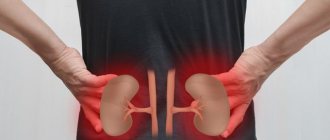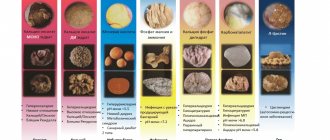General information
Nephritis is a group of kidney diseases of an inflammatory nature. There are two main forms in children: hereditary and acquired.
The inflammatory process usually occurs in both kidneys of the child, spreading to the pyelocaliceal system, renal glomeruli and tubules. This disease can appear even in newborns; in medicine there is currently no consensus on what the mechanism of the onset and development of the disease is. Acute tubulointerstitial nephritis is usually provoked in children by a hereditary predisposition, accompanied by infection and allergies. Source: N.I. Khlebovets Tubulointerstitial nephritis in children // Journal of Grodno State University, 2014, No. 1, pp. 94-97
Causes
The main cause of the disease is the penetration of infection into the tissues of the kidneys and urinary tract from the outside or from another organ where an inflammatory process is observed at one stage or another. The infectious process can be started by:
- Recently suffered infectious diseases, the pathogens of which were not completely destroyed.
- Regular hypothermia of the body.
- Malfunctions of the immune system, its depressed state due to surgery or serious illness.
- Disruption of the blood supply to the kidneys.
- Stagnation of urine, the chemical environment of which is favorable for the development of pathogenic microorganisms.
Depending on the duration and nature of the disease, acute and chronic nephritis are distinguished. The first type of disease often occurs as a result of taking “aggressive” medications: antibiotics, anti-inflammatory drugs, immunosuppressants and diuretics, analgesics and drugs that suppress pathogens of viral and bacterial diseases. A negative reaction of the kidneys to the drug taken becomes the main cause of inflammation, especially in elderly patients and people with congestion in the body.
Chronic nephritis occurs due to a long course of the acute stage of the disease and the lack of proper treatment. The situation is worsened by uncontrolled use of medications and the presence of foci of cancer in the body. If it is not possible to accurately determine the cause of kidney inflammation, the patient is diagnosed with “idiopathic nephritis”, and the course of treatment is developed on a strictly individual basis.
The main causes of illness in childhood:
- various maternal illnesses during pregnancy;
- diabetes;
- oncology;
- autoimmune processes;
- myeloma;
- vasculitis;
- acute infections;
- thrombosis;
- damage to the body by salts of heavy metals;
- self-medication with medications without specialist supervision (the use of antibiotics without appropriate prescription is especially dangerous);
- reactions to vaccines;
- hypothermia;
- tuberculosis.
1.What is chronic interstitial nephritis and its causes?
Chronic interstitial (tubulointerstitial) nephritis, abbreviated as CIN, is a non-infectious inflammatory disease of the kidneys. In chronic interstitial nephritis, the renal tubules and interstitial tissue are affected.
Causes of chronic interstitial nephritis
The causes of CIN can be very different. Acute interstitial nephritis (AIN)—untreated or undiagnosed—can develop into chronic interstitial nephritis. However, much more often chronic interstitial nephritis appears without AIN. The causes of interstitial nephritis can be:
- Intoxication of the body;
- Radiation;
- Metabolic disorders;
- Problems with the immune system;
- Infections;
- Abuse of certain drugs (analgesics, antipyretics and non-steroidal anti-inflammatory drugs).
It is also worth mentioning that in approximately every fifth patient the cause of chronic interstitial nephritis cannot be determined.
A must read! Help with treatment and hospitalization!
Symptoms of the disease
Symptoms are usually the same, regardless of the cause of kidney damage, and are also similar for children of any age - from newborns to teenagers:
- swelling;
- decreased appetite;
- general weakness;
- feeling of dry mouth;
- chills;
- skin redness;
- dry skin, hair, nails;
- headache;
- pain in the lumbar area;
- convulsions;
- small volume of daily urine;
- bloating;
- vomiting and other gastrointestinal disorders.
If the disease lasts for a long time, then the death of a large number of renal glomeruli occurs. As a result, kidney failure occurs.
The chronic form of the disease is characterized by:
- intense sweating, increasing at night;
- decreased appetite;
- yellow skin tone;
- frequent urge to urinate;
- pain during urination;
- cloudy urine.
Classification of jades
| Type of jade | Peculiarities |
| Pyelonephritis | Inflammatory process in the pyelocaliceal system. It is bacterial in nature, provoked by E. coli, staphylococcus and a number of other pathogens. |
| Glomerulonephritis | The kidney glomeruli are negatively affected. It can be of three forms: acute, subacute and chronic. Characterized by swelling, blood in the urine, increased blood pressure. Source: Lechon FC, Espi MT, Abal RP, Peiro JLE Acute glomerulonephritis associated with pneumonia: review of three cases. Ped. Nephrol. 2010; 25: 161-164 |
| Interstitial nephritis in children | Damage to renal tissues and tubules. The causes are viruses, uncontrolled use of diuretics and antibiotics. |
| Tubulointerstitial | Damage to the interstitial tissue of the kidneys and tubules, aseptic inflammation of the tissues. The process involves the lymph flow and blood vessels. |
| Lupus | The cause is lupus erythematosus, which provokes inflammation not only in the kidneys. Source: G.A. Makovetskaya, L.I. Mazur, V.N. Barinov, E.A. Barannikova, E.M. Romadanova, P.V. Morinets Lupus nephritis in children: manifestation, diagnosis, treatment // Russian Bulletin of Perinatology and Pediatrics, 2021, No. 62(4), p.185-186 |
| Acquired diffuse | Streptococcal infection in a newborn, damage to kidney tissue. |
| Ray | It is provoked by ionizing radiation, as a result of which the function of the renal tubules is impaired. In the chronic form, renal failure or arterial hypertension develops. |
| Hereditary | At the beginning of development, symptoms are almost completely absent. As the disease progresses, hearing and vision may decrease, unusual fatigue may appear, and the skin often turns pale. |
Kidney inflammation (nephritis): diagnosis and treatment
Inflammatory processes accompanied by changes in the structure of the kidneys and disruption of their function are called nephritis. This is a common disease that requires accurate diagnosis for proper treatment. At the MedEx clinic, you can undergo an examination, based on the results of which the doctor will prescribe comprehensive treatment.
Symptoms of inflammation
At the very beginning of the disease, a person complains of general malaise; there are no specific symptoms of kidney inflammation. You may experience lower back pain, loss of appetite, and headaches.
As the disease progresses, the following symptoms appear:
- nagging pain in the lumbar region;
- decrease in urine volume;
- cloudy, dark-colored urine consistency;
- urinary incontinence (in the acute stage);
- swelling of the legs, arms and face;
- temperature increase;
- chills;
- pressure surges;
- nausea, gag reflex.
If you find several signs of inflammation in the kidney area, you need to consult a specialist. The doctor will conduct an examination, prescribe diagnostic tests and select a treatment regimen.
You should not resort to self-medication, as this can significantly aggravate the pathological processes. To avoid dangerous consequences, you should consult a urologist at the first symptoms of pathology.
Reasons for the development of nephritis
The disease appears for the following reasons:
- decreased immunity;
- respiratory infections;
- chronic inflammation;
- stones in the bladder and kidneys;
- impaired functioning of the kidneys and bladder.
The causes of nephritis may be complications of an infectious disease. Inflammation appears at 2–3 weeks of development of the acute form. Exacerbation of nephritis occurs with overwork, lack of vitamins, and general hypothermia.
Diagnosis of the disease
Kidney inflammation (nephritis) is diagnosed by a doctor at an appointment. For an accurate diagnosis, a number of measures must be taken:
- general tests;
- tests according to Nechiporenko, Zimnitsky, Volgard;
- ultrasound examination of the kidney to detect stones;
- kidney tissue biopsy.
If necessary, the doctor may order an x-ray or CT scan of the kidney.
Our clinic is equipped with modern equipment for high-quality diagnosis of nephritis. We conduct laboratory tests and instrumental diagnostics to obtain a complete picture of the causes and development of the disease.
Types of jade
Highlight:
1. Pyelonephritis is an inflammation of a bacterial nature.
2. Shunt - damage to the renal glomeruli with complications of antibody complexes.
3. Interstitial - occurs due to infection or medication. Inflammation develops in the interstitial tissue. With timely treatment, recovery occurs within a few weeks.
4. Glomerulonephritis - damage to the glomeruli in acute and chronic form. The acute form may appear suddenly after hepatitis or tonsillitis. To prevent kidney damage, it is necessary to seek medical help promptly.
5. Berger's disease (nephropathy) is a common form of nephritis that develops when antibodies are deposited in the kidneys. Nephropathy often affects men.
Treatment of nephritis
Based on the examination and research results, our specialist makes a diagnosis and decides how to treat nephritis - with the use of herbal remedies, medications and/or physiotherapy.
Drug treatment of nephritis involves a complex effect. The patient is prescribed an antibiotic, anti-inflammatory drugs, vitamins and restorative drugs.
Regardless of the method, quality rest and diet are essential. Food should be rich in minerals and microelements. You should refrain from spices, herbs and salt.
In advanced cases, when medications and physiotherapeutic procedures do not help, doctors can perform a gentle operation to resection or remove the source of infection. In case of renal failure, hemodialysis is used.
Preventive measures
To prevent kidney inflammation, it is necessary to support the immune system, avoid stress, hypothermia, and increased stress. When the first signs of inflammation appear, you should consult a doctor. Preventing a disease is easier than treating it and dealing with its consequences.
Diagnosis and treatment of nephritis in Moscow
At the MedEx personal medicine clinic, you can make an appointment with a urologist, who will conduct ultrasound and laboratory diagnostics of inflammation and prescribe a treatment regimen. Extensive experience of specialists and modern equipment allow us to identify the true causes of nephritis and effectively treat the disease at any stage.
To make an appointment, call us by phone or use the form on the website.
Methods of treating the disease
Important! Treatment should only be carried out by a doctor who strictly controls the course of therapy. It is prohibited to try to cure a child on your own, use folk remedies, or rely on the experience of other parents.
After making a diagnosis, the doctor prescribes a special diet for the child. The child must be kept in bed and not be exposed to stress or stress.
Drug therapy is carried out using vitamin complexes and antibiotics. It can be adjusted if the expected effect is not achieved. The duration of drug treatment is usually long - up to one and a half months.
Sometimes (in the presence of toxins in the blood plasma) plasmapheresis and hemosorption (blood purification) are performed.
Any therapy requires the participation of a specialist and regular tests to monitor the progress of treatment. When the main course is completed, children are often sent to sanatoriums and physiotherapy is recommended.
Treatment
A patient with signs of nephritis is given strict bed rest, which helps reduce the rate of spread of infection through the circulatory system and internal organs. You can cope with the disease by:
- Taking medications to eliminate the causes of inflammation. A course of antibiotics, antiviral drugs, hemosorption procedures and plasmaphoresis to destroy the pathogen in the patient’s blood gives a good effect.
- Blocking the development of the inflammatory process and its spread throughout the body. The effect is achieved by taking hormonal drugs, antihistamines, and medications to activate blood circulation in the kidney tissues.
- Symptomatic treatment to alleviate the patient's condition. The course includes water-electrolyte drips, monitoring of daily urination, intestinal or hemodialysis, which allows you to remove metabolic products from the body.
A prerequisite for successful treatment is a diet for nephritis, the main requirements of which are reducing the amount of salt in the diet and limiting the volume of fluid to 700-800 ml, depending on the patient’s body weight. Treatment is carried out under the strict supervision of a doctor, and its content is adjusted as monitoring indicators change and signs of recovery appear.
Methods for preventing childhood nephritis
Parents should be aware that self-prescription of preventive medications is unacceptable. Even after an examination, only a doctor should do this.
As part of prevention, it is important to monitor the child’s lifestyle, promptly identify alarming symptoms, and conduct medical examinations in this profile. For children at risk, physical therapy, hardening, moderate physical activity, and adherence to a certain diet are recommended (consult a doctor to determine this).
Advantages of SM-Clinic
Our medical center employs some of the best specialists in the Northern capital: pediatric nephrologists, urologists, pediatricians.
“SM-Clinic” has modern equipment, thanks to which diseases are diagnosed quickly and accurately. This makes it possible to return children to normal life in a short time. We have no queues, the approach to each child is always individual and delicate. If inpatient observation is required, comfortable rooms are provided.
Sources:
- N.I. Khlebovets. Tubulointerstitial nephritis in children // Journal of Grodno State University, 2014, No. 1, pp. 94-97.
- Lechon FC, Espi MT, Abal RP, Peiro JLE. Acute glomerulonephritis associated with pneumonia: review of three cases. Ped. Nephrol. 2010; 25: 161-164.
- G.A. Makovetskaya, L.I. Mazur, V.N. Barinov, E.A. Barannikova, E.M. Romadanova, P.V. Morinets. Lupus nephritis in children: manifestation, diagnosis, treatment // Russian Bulletin of Perinatology and Pediatrics, 2021, No. 62(4), pp. 185-186.
Lavrishcheva Yulia Vladimirovna Clinic
Author of the article
Lavrishcheva Yulia Vladimirovna
Doctor of the first qualification category
Specialty: nephrologist
Experience: 13 years
The information in this article is provided for reference purposes and does not replace advice from a qualified professional. Don't self-medicate! At the first signs of illness, you should consult a doctor.
Prices
| Name of service (price list incomplete) | Price |
| Appointment (examination, consultation) with a medical specialist, primary, therapeutic and diagnostic, outpatient (other specialties) | 1750 rub. |
| Consultation (interpretation) with analyzes from third parties | 2250 rub. |
| Prescription of treatment regimen (for up to 1 month) | 1800 rub. |
| Prescription of treatment regimen (for a period of 1 month) | 2700 rub. |
| Consultation with a candidate of medical sciences | 2500 rub. |
| Kidney ultrasound | 1700 rub. |
| Ultrasound scanning of kidney vessels | 2500 rub. |




